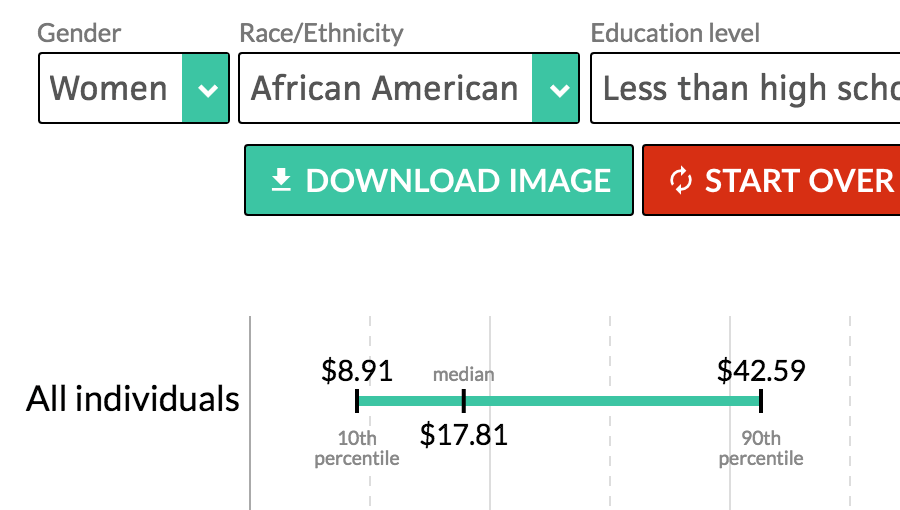Brad DeLong: Worthy reads on equitable growth, July 26–August 1, 2019
Worthy reads from Equitable Growth:
Here are links to four important pieces at the Washington Center for Equitable Growth providing context to the recent presidential primary debates:
- Carmen Ye, “Why we need better re-employment policies for formerly incarcerated African American men,” in which she writes: “African American men … 33 percent of the 1.56 million Americans held in state or federal prisons … When these men are released from prison, what will their employment prospects look like? … Black applicants with no criminal record receive a callback or job offer at the same rate as white applicants with a felony conviction. Yet black applicants without a criminal record were three times as likely to get a callback as those with a record.”
- Will McGrew, “Investments in early childhood education improve outcomes for program participants—and perhaps other children too,” in which he writes: “Governments that spend money on early childhood education get a lot of bang for their buck—an estimated 7 percent to 10 percent annual return for programs targeted at disadvantaged children … [plus] also long-term improvements in human capital and earnings. But do those test-score gains last? … Mariana Zerpa … finds that children in states with early childhood education programs are 30 percent less likely to repeat a grade between ages 6 and 8—and that this effect lasts at least until age 12.”
- Equitable Growth, “Gender wage inequality in the United States: Causes and solutions to improve family well-being and economic growth”: “Disparities between men’s and women’s wages in the United States hinders economic growth by constraining family incomes and spending power. When comparing average full-time year-round incomes of men to those of women, research indicates that women make only 80.5 percent of men’s wages, a gap that is even larger when accounting for race. In the long run, these disparities heighten the risks of financial stress and inadequate retirement savings at times of economic shocks.”
- Greg Leiserson, “Wealth taxation: An introduction to net worth taxes and how one might work in the United States,” in which he writes: “Probably the most significant challenge in implementing a net worth tax is that determining tax liabilities requires a valuation for all of the assets subject to the tax … Such a tax would impose burden primarily on the wealthiest families—reducing wealth inequality—and could raise substantial revenues. As noted above, the United States taxes wealth in several forms already. Thus, the policy debate is less about whether to tax wealth and more about the best ways to tax wealth and how much it should be taxed. A net worth tax could be a useful complement to—or substitute for—other means of taxing wealth, as well as a tool for increasing overall taxation of wealth.”
Worthy reads not from Equitable Growth:
- The Tax Cuts and Jobs Act of 2017 was supposed to produce faster growth even though it was inequitable. But that hope appears to have been vain. Read Dan Drezner, “How Donald Trump is sanctioning the U.S. economy,” in which he writes: “Second-quarter GDP growth was only 2.1 percent … far short of the 3 percent target that President Trump has repeatedly promised. Data revisions released Friday wiped away what had been a prized talking point for the White House: GDP grew 2.5 percent for all of 2018, down from the 3 percent previously reported … [and] a far cry from Larry Kudlow’s 2018 claim that GDP growth would top 4 percent for a few quarters … Trump has unwittingly sanctioned the U.S. economy … has made himself the uncertainty engine for those interested in investing in the United States. And the effects are starting to be felt. In the second quarter, business investment was -0.6 percent. As in, negative … Part of the problem is the drying up of foreign direct investment … How will Trump react to the growth news? It is possible that he will respond in a mature fashion.”
- These numbers on the human costs of the Supreme Court’s decision in National Federation of Independent Business v. Sibelius are only about one-quarter of what I had feared. Read Scott Lemieux, “Matters of Life and Death,” in which he writes: “15,000 people died in three years because Republican states refused to accept the Medicaid expansion … And let us not forget that this was all made possible by the intervention of the Supreme Court, based on arguments so weak that, as Joan Biskupic’s new bio finds, [Supreme Court Chief Justice] John Roberts himself initially rejected them … Regarding the expansion of Medicaid for poor people, all four liberal justices … voted to uphold the program … [and] punctured … arguments that Congress had exceeded its spending power and its ability to attach conditions … In the private March 30 conference, Roberts also voted to uphold the Medicaid expansion.”
- At a recent conference, my fellow University of California, Berkeley professor and former President’s Council of Economic Adviser’s Chair Laura D. Tyson gave a powerful endorsement and shout-out to this book by my fellow UC-Berkeley professor Barry Eichengreen as the best survey of the history and prospect of what he calls “populism” and I would call “neo-fascism.” Read Barry Eichengreen’s new book, The Populist Temptation: Economic Grievance and Political Reaction in the Modern Era. Here are excerpts from a summary of the book: “Populists tend to thrive most in the wake of economic downturns, when it is easy to convince the masses of elite malfeasance. Yet while there is more than a grain of truth that bankers, financiers, and ‘bought’ politicians are responsible for the mess, populists’ own solutions tend to be simplistic and economically counterproductive. Moreover, by arguing that the ordinary people are at the mercy of extra-national forces beyond their control—international capital, immigrants, cosmopolitan globalists—populists often degenerate into demagoguery and xenophobia. There is no one solution … [but] there is an obvious place to start: shoring up and improving the welfare state … America’s patchwork welfare state was not well equipped to deal with the economic fallout that attended globalization and the decline of manufacturing in America … Lucidly explaining both the appeals and dangers of populism across history, this book is essential reading for anyone seeking to understand not just the populist phenomenon, but more generally the lasting political fallout that follows in the wake of major economic crises.”
- Adopting robots may cost jobs, but not adopting robots appears to cost many more jobs. Read Wolfgang Dauth, Sebastian Findeisen, Jens Südekum, and Nicole Woessner, “Robots and firms,” in which they write: “Our study is based on firm-level data from Spain, a country with one of the highest robot density levels per worker in Europe. The data come from the Encuesta Sobre Estrategias Empresariales, an annual survey of around 1,900 Spanish manufacturing firms … We reveal significant job losses in non-adopting firms. Our estimates imply that 10 percent of jobs in non-adopting firms are destroyed when the share of sales attributable to robot-using firms in their industries increases from zero to one half. The same logic applies to changes in output and survival probabilities … Aggregate productivity gains are partly driven by substantial intra-industry reallocation of market shares and resources following a more widespread diffusion of robot technology, and a polarization between high-productivity robot adopters and low-productivity non-adopters.”







